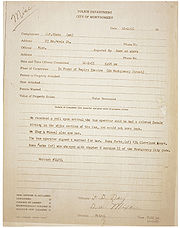
James F. Blake
Encyclopedia

Rosa Parks
Rosa Louise McCauley Parks was an African-American civil rights activist, whom the U.S. Congress called "the first lady of civil rights", and "the mother of the freedom movement"....
defied in 1955, prompting the Montgomery Bus Boycott
Montgomery Bus Boycott
The Montgomery Bus Boycott was a political and social protest campaign that started in 1955 in Montgomery, Alabama, USA, intended to oppose the city's policy of racial segregation on its public transit system. Many important figures in the civil rights movement were involved in the boycott,...
. Blake served in the Army
United States Army
The United States Army is the main branch of the United States Armed Forces responsible for land-based military operations. It is the largest and oldest established branch of the U.S. military, and is one of seven U.S. uniformed services...
in the European theatre
European Theatre of World War II
The European Theatre of World War II was a huge area of heavy fighting across Europe from Germany's invasion of Poland on September 1, 1939 until the end of the war with the German unconditional surrender on May 8, 1945...
during World War II
World War II
World War II, or the Second World War , was a global conflict lasting from 1939 to 1945, involving most of the world's nations—including all of the great powers—eventually forming two opposing military alliances: the Allies and the Axis...
. He worked as a bus driver for Montgomery City Bus Lines until 1974.
One day in 1943, Parks boarded the bus and paid the fare. She then moved to her seat but Blake told her to follow city rules and enter the bus again from the back door. Parks exited the bus, but before she could re-board at the rear door, Blake drove off, leaving her to walk home in the rain.
On December 1, 1955 they encountered each other again when Blake ordered Rosa Parks
Rosa Parks
Rosa Louise McCauley Parks was an African-American civil rights activist, whom the U.S. Congress called "the first lady of civil rights", and "the mother of the freedom movement"....
and three other blacks to move from the middle to the back of his Cleveland Avenue bus (number 2857) in order to make room for a white passenger. By Parks' account, Blake said, "Y'all better make it light on yourselves and let me have those seats." When she refused, Blake contacted the police and signed the warrant for her arrest (Chapter 6, Section II of the city code gave drivers police powers to racially assign seats). This arrest sparked the Montgomery Bus Boycott
Montgomery Bus Boycott
The Montgomery Bus Boycott was a political and social protest campaign that started in 1955 in Montgomery, Alabama, USA, intended to oppose the city's policy of racial segregation on its public transit system. Many important figures in the civil rights movement were involved in the boycott,...
and led to Browder v. Gayle
Browder v. Gayle
Browder v. Gayle, 142 F. Supp. 707 , was a case heard before the United States District Court for the Middle District of Alabama on Montgomery bus segregation laws...
, the 1956 court case on the basis of which a United States District Court abolished segregation in transportation for the jurisdiction in which Montgomery, Alabama is located.
Commenting on the event afterwards, Blake stated, "I wasn't trying to do anything to that Parks woman except do my job. She was in violation of the city codes, so what was I supposed to do? That damn bus was full and she wouldn't move back. I had my orders."
Blake continued working at the bus company for another 19 years. He died of a heart attack
Myocardial infarction
Myocardial infarction or acute myocardial infarction , commonly known as a heart attack, results from the interruption of blood supply to a part of the heart, causing heart cells to die...
in his Montgomery home in 2002.

